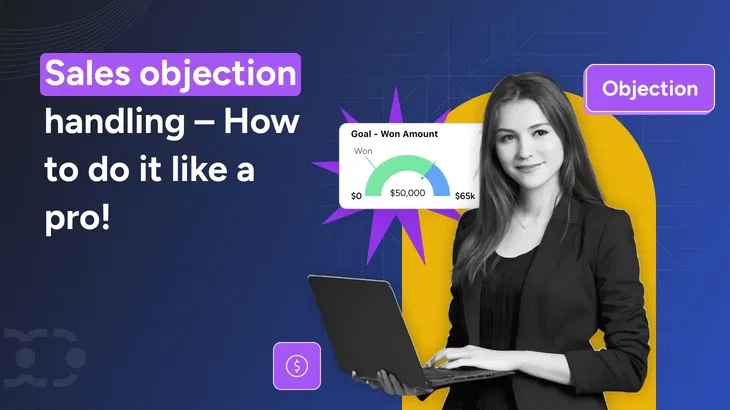You might come across companies who are already using your competitor’s product.
However, that doesn’t mean you can’t draw their attention towards your product.
There are possibilities that they might not be happy using the product or aren’t ready to switch and adapt the product of a new provider.
How to handle this sales objection?
- Find the gap between the two products and plant the seed of doubt in the prospect’s mind.
- Point out the unique benefits of your product that your competitors don’t offer.
- If you have any customer who has used that specific competitor’s product before then present their example.
Best practices to handle sales objections
“Success seems to be connected with action. Successful people keep moving. They make mistakes, but they don’t quit.” – Conrad Hilton
Don’t panic or give up when objections come in your way. Stay calm, determined and optimistic to close the sales deal successfully.
Here are the best practices you need to follow while handling objections.
1. Build a good rapport
Instead of getting defensive when a prospect objects, try to understand them.
- Listen to their objections carefully.
- Make them comfortable so that they can share all their concerns freely.
- Sometimes the prospects hide the real concerns and use some excuses to avoid the conversation.
So, connect with your prospect at a personalized level and create a good rapport.
2. Dig deeper and explore the objections
Gain more insights into your prospect’s objection by asking open-ended questions.
Most of the sales professionals find it awkward to question the prospects when they are raising objections.
Don’t hesitate to question the prospect. Questions are the only way to understand what’s stopping your buyers from purchasing the product.
Ask them to elaborate on their objections.
3. Gain more clarity
Sometimes it becomes difficult to understand the actual issue that is hampering the buying decision.
Often sales professionals do the guesswork and land into trouble.
Don’t assume anything in sales and complicate things. If you are in doubt, clarify the objection to ensure you have understood the underlying issue. Be direct and clear.
Sometimes clarifications can save you from disastrous results. So, discuss and clarify confidently.
4. Write it down or record the sales objection
Your prospects might have multiple objections. In that case, you need to either write them down or record it to ensure you don’t miss out on any objections.
The best thing to do is use a CRM with the built-in virtual phone system.
By doing this, you’ll have all the details about the deal in front of you while communicating with the client.
You can easily take notes or record the call to keep track of the objections.
Once you have the objections, prioritize and tackle the objections one after another.
5. Prepare yourself and get better
Convene the sales team and discuss the objections raised by the clients.
Though your target audience is the same, each entrepreneur will have different objections.
So, make a list of objections that the teammates frequently face. Find out ways to deal with these objections.
Conduct mock calls with the head of the department and get prepared to deal with difficult sales objections.
Ask the other teammates to stay attentive during the mock calls and suggest the alternatives for the responses to the objections.
“Before anything else, preparation is the key to success.” - Alexander Graham Bell
6. Pause and then speak carefully
Objection handling should be done with a calm mind. Do not immediately respond to an objection.
Pause, think, and choose your words carefully.
Unsuccessful salespeople tend to interrupt prospects while they are speaking.
They speak quickly without thinking and make rash decisions, which is why they fail to convert a prospect into a paying customer.
Handling sales objections is equivalent to playing chess, you need to think critically, or you will end up losing.
So take some time, ponder over the objection, and then respond.
7. Explain how your solution helped others
When a prospect objects, do not become defensive. Instead, try to be polite and earn their trust and confidence.
Assure them that you are genuinely interested in helping them. Give your prospects real-life examples.
Explain how your solution helped a customer address a similar issue that the prospect is currently facing. Share case studies to build credibility.
8. Take the preferred time to follow-up
Prospects often ask for more time to think. Give them the time they require for pondering over your solution.
However, do ask for a preferred time to call or email the prospect. Follow-up is crucial in sales.
Without follow-up, it is difficult to close a deal. If you delay the conversation, there are chances that the deal might slip through the crack.
So, do not stretch it for too long, follow up after a few days, and come to a conclusion.
Wrapping up
Sales objection is one of the most difficult stages of the sales process. Still, most of the top performers have handled it and moved the deal to the closing stage.
Nothing is impossible if you stay focused. Keep improving and finding new ways to handle sales objections.
Make the most of high-end tools like Salesmate to manage your sales prospects and keep track of their concerns.
With Salesmate CRM, you can compile sales data and analyze it to improve your performance as well as sales results.





Key takeaways
‘Sales objection’ is one of the major hurdles that sales reps face during their sales journey.
Most of the sales reps lose maximum deals at this stage of the sales process.
This mostly happens because they either give up or aren’t aware of the right ways to tackle the sales objections.
Sales objections arise when a sales prospect has a concern regarding the product/service.
For achieving positive sales results, you’ll have to handle these concerns wisely.
Getting aggressive or arguing with them won’t help. Your response to their concerns should be strong enough to change their minds and bring them to a different conclusion.
The success rate is 64% if you can understand a buyer’s objection.
What is objection handling?
Objection handling is a crucial part of the sales process where sales reps address all the objections of the prospects to move them ahead in the sales pipeline.
Objection handling needs to be done in the right way without infuriating the prospects.
Some sales reps get defensive and tend to argue after hearing an objection. Due to that, they end up losing a deal.
For handling objections, the sales reps need to be calm and polite. Listening is an essential skill required for objecting handing.
The sales reps must understand the client’s concern and then find out a midway that’s beneficial for both.
Common sales objections and how to handle them wisely
Effective objection handling can take you closer to your sales goals.
Here are the most common sales objections that block the success route of the sales professionals:
1. “Price is too high”
Regardless of what you are selling, there are high chances you’ll come across buyers who have a problem with the pricing of the product.
Well, no one likes to spend their precious dollars.
Most of the sales reps instantly lower the price or offer a discount when a client raises the price objection. But that’s like compromising with the company’s profits.
How to handle this sales objection?
2. “Need to consult__”
“I’ll consult my boss/partner and get back to you”. In most of the cases, such prospects never return.
This is just a stalling tactic used by most of the disinterested prospects. Don’t fall into the trap and wait for them.
How to handle this sales objection?
3. “Send me some information”
This is the most common excuse used by prospects to escape a conversation.
Sometimes you don’t even get a chance to present the value proposition of your product or ask qualification questions.
Don’t just send the information and surrender the deal. Take charge of the situation and ensure your sales prospect doesn’t hang up before answering the vital questions.
How to handle this sales objection?
Be polite and reply-
4. “Don’t have the need right now”
It’s human nature that most people don’t look for a change until they experience any severe trouble.
Few businesses are so comfortable with their current operations that they are not ready to try something new.
Take them out of their comfort zone and show them the bigger picture. Make them realize the profits they are missing by not embracing the change.
How to handle this sales objection?
5. “We are already working with_______(your competitor)”
You might come across companies who are already using your competitor’s product.
However, that doesn’t mean you can’t draw their attention towards your product.
There are possibilities that they might not be happy using the product or aren’t ready to switch and adapt the product of a new provider.
How to handle this sales objection?
Best practices to handle sales objections
“Success seems to be connected with action. Successful people keep moving. They make mistakes, but they don’t quit.” – Conrad Hilton
Don’t panic or give up when objections come in your way. Stay calm, determined and optimistic to close the sales deal successfully.
Here are the best practices you need to follow while handling objections.
1. Build a good rapport
Instead of getting defensive when a prospect objects, try to understand them.
So, connect with your prospect at a personalized level and create a good rapport.
2. Dig deeper and explore the objections
Gain more insights into your prospect’s objection by asking open-ended questions.
Most of the sales professionals find it awkward to question the prospects when they are raising objections.
Don’t hesitate to question the prospect. Questions are the only way to understand what’s stopping your buyers from purchasing the product.
Ask them to elaborate on their objections.
3. Gain more clarity
Sometimes it becomes difficult to understand the actual issue that is hampering the buying decision.
Often sales professionals do the guesswork and land into trouble.
Don’t assume anything in sales and complicate things. If you are in doubt, clarify the objection to ensure you have understood the underlying issue. Be direct and clear.
Sometimes clarifications can save you from disastrous results. So, discuss and clarify confidently.
4. Write it down or record the sales objection
Your prospects might have multiple objections. In that case, you need to either write them down or record it to ensure you don’t miss out on any objections.
The best thing to do is use a CRM with the built-in virtual phone system.
By doing this, you’ll have all the details about the deal in front of you while communicating with the client.
You can easily take notes or record the call to keep track of the objections.
Once you have the objections, prioritize and tackle the objections one after another.
5. Prepare yourself and get better
Convene the sales team and discuss the objections raised by the clients.
Though your target audience is the same, each entrepreneur will have different objections.
So, make a list of objections that the teammates frequently face. Find out ways to deal with these objections.
Conduct mock calls with the head of the department and get prepared to deal with difficult sales objections.
Ask the other teammates to stay attentive during the mock calls and suggest the alternatives for the responses to the objections.
6. Pause and then speak carefully
Objection handling should be done with a calm mind. Do not immediately respond to an objection.
Pause, think, and choose your words carefully.
Unsuccessful salespeople tend to interrupt prospects while they are speaking.
They speak quickly without thinking and make rash decisions, which is why they fail to convert a prospect into a paying customer.
Handling sales objections is equivalent to playing chess, you need to think critically, or you will end up losing.
So take some time, ponder over the objection, and then respond.
7. Explain how your solution helped others
When a prospect objects, do not become defensive. Instead, try to be polite and earn their trust and confidence.
Assure them that you are genuinely interested in helping them. Give your prospects real-life examples.
Explain how your solution helped a customer address a similar issue that the prospect is currently facing. Share case studies to build credibility.
8. Take the preferred time to follow-up
Prospects often ask for more time to think. Give them the time they require for pondering over your solution.
However, do ask for a preferred time to call or email the prospect. Follow-up is crucial in sales.
Without follow-up, it is difficult to close a deal. If you delay the conversation, there are chances that the deal might slip through the crack.
So, do not stretch it for too long, follow up after a few days, and come to a conclusion.
Wrapping up
Sales objection is one of the most difficult stages of the sales process. Still, most of the top performers have handled it and moved the deal to the closing stage.
Nothing is impossible if you stay focused. Keep improving and finding new ways to handle sales objections.
Make the most of high-end tools like Salesmate to manage your sales prospects and keep track of their concerns.
With Salesmate CRM, you can compile sales data and analyze it to improve your performance as well as sales results.
Frequently asked questions
1. What is objection handling in sales?
Objection handling in sales is the process of addressing a prospect's concerns or reservations about a product or service to help them move forward in the sales journey.
2. Why is objection handling in sales important?
Objection handling is crucial because it directly impacts the success of a sales process.
By effectively addressing objections, sales reps can build trust, clarify misunderstandings, and showcase how the product solves the prospect's challenges.
3. Why do sales reps lose deals at the objection stage?
Sales reps often lose deals because they either give up too soon or lack the skills to handle objections effectively.
4. What are the best practices for handling objections?
Hinal Tanna
SEO SpecialistHinal Tanna is a SEO strategist and content marketer, currently working with the marketing team of Salesmate. She has a knack for curating content that follows SEO practices and helps businesses create an impactful brand presence. When she's not working, Hinal likes to spend her time exploring new places.